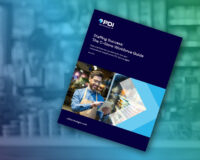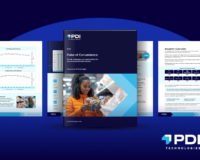
When you consider the core challenges facing fuel wholesalers—rising labor costs and industry consolidation, along with fluctuating fuel demand and pricing—it’s clear they’re operating in an increasingly competitive environment with razor-thin profit margins.
Although the industry was never built to move at the same speed as large retailers such as Amazon and Walmart, it’s important to understand how these giants have redefined customer experience, efficiency, and expectation levels for all types of enterprises. The key to their success has been an ability to reimagine their business strategy—and a willingness to change.
When you realize that change is inevitable, the question becomes whether you’ll be distancing yourself from the competition, or vice versa. That question is particularly relevant to fuel wholesalers in an extremely important area: digital transformation.
It’s clear the industry is picking up the pace toward digitization, and if you’re not accelerating your own efforts, you risk getting left behind. Unfortunately, a continued reliance on legacy IT systems is perhaps the biggest factor inhibiting digital transformation for many businesses. Just like you shouldn’t build a new house on a crumbling foundation, you can’t build your digital strategy on an aging technology infrastructure.
If you’ve been hesitant to ramp up your digital transformation efforts, you need to ask yourself:
- Does your current technology infrastructure help you reduce friction while delivering end-to-end business visibility?
- Does your staff have the right tools to maximize their productivity, or are they wasting time on mundane tasks that could otherwise be automated?
- Are your IT processes delivering maximum business value at the least possible cost?
Making a Strong Case for Digital Transformation
Your ability to leverage technology, people, and processes can fundamentally change your business results—and sometimes all it takes is a willingness to adapt. If you think about the technology obstacles inhibiting modernization, they usually come down to:
- Information silos and a lack of shared resources
- Disparate IT systems that don’t work well together
- Manual, resource-intensive processes
- Legacy technology that won’t scale with your business
Combine any of those elements, and you’re suddenly stuck with far too much complexity, unnecessary risk exposure, and limited transparency across your enterprise. In turn, that can make your business technically obsolete, less competitive, and slower in managing market disruptions. Meanwhile, your competitors who have already begun to modernize can operate leaner (reducing costs) while moving faster (quickly adapting to new technologies and trends).
By embracing a digital-first approach, you can eliminate many of these technology barriers and optimize your operating efficiency. After all, if there’s one fundamental lesson from the COVID-19 pandemic, it was the fact that digitized businesses are much more agile in adapting to changing market conditions.
Improving Transparency, Efficiency, and Agility
The ability to operate with greater agility across a digitally connected supply chain is critical to your long-term success. This is where a modern, cloud-based technology infrastructure can pay major dividends. Cloud solutions provide highly flexible models (private, public, or hybrid) that leverage the latest technologies and help you connect seamlessly with vendors, partners, and customers alike.
In addition, simpler integrated solutions help eliminate the hodgepodge of IT systems and the management complexity they create. When implemented correctly, a comprehensive digitalization strategy also reduces friction while improving operational transparency and helping you manage the unexpected. Moreover, it supports a more sustainable business model in terms of flexibility, security, and reliability across your entire supply chain.
A strong digital foundation also positions you for the next wave of innovation, including AI, machine learning, and robotics. With 5G on the horizon, you can also expect to see enormous growth in IoT devices with next-generation connectivity. Being able to easily connect your systems with all those new devices (and their data) can lead to better decision-making as you turn raw data into profitable, real-time insights.
Maximizing the Payoff of Digital Transformation
The more you can accelerate your digital transformation timeline, the sooner you can begin to leverage the types of modern technologies and applications that deliver immediate and measurable results. One of the fastest ways to realize gains is to pair your digital transformation with end-to-end ERP solutions designed specifically for fuel wholesalers.
Tapping into sophisticated capabilities is a great way to maximize efficiency. Integrating ERP and fuel pricing solutions that utilize machine learning can also help you focus on maximizing profitability and identifying new market opportunities.
These robust, secure, and scalable solutions can help you attract new customers, keep existing ones satisfied, boost engagement, and ultimately drive higher revenue. Best of all, you can implement them on your own terms, determining the pace that best matches your unique business requirements—and aligning step by step with your digital transformation.


